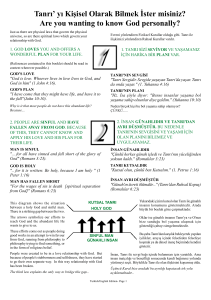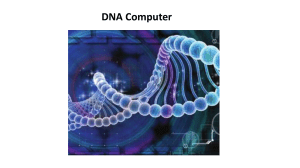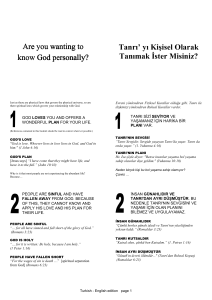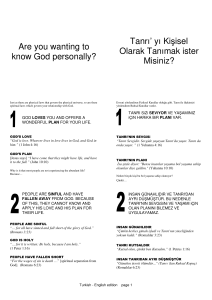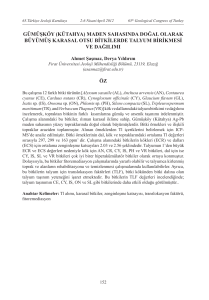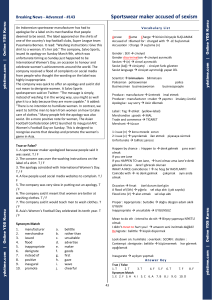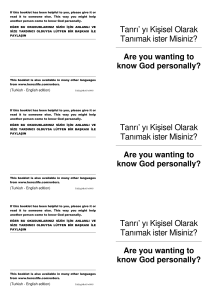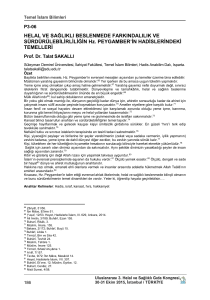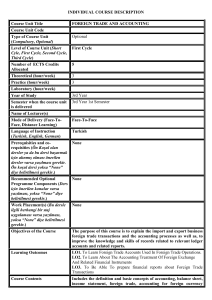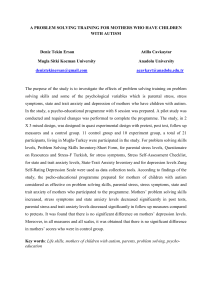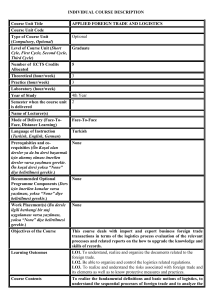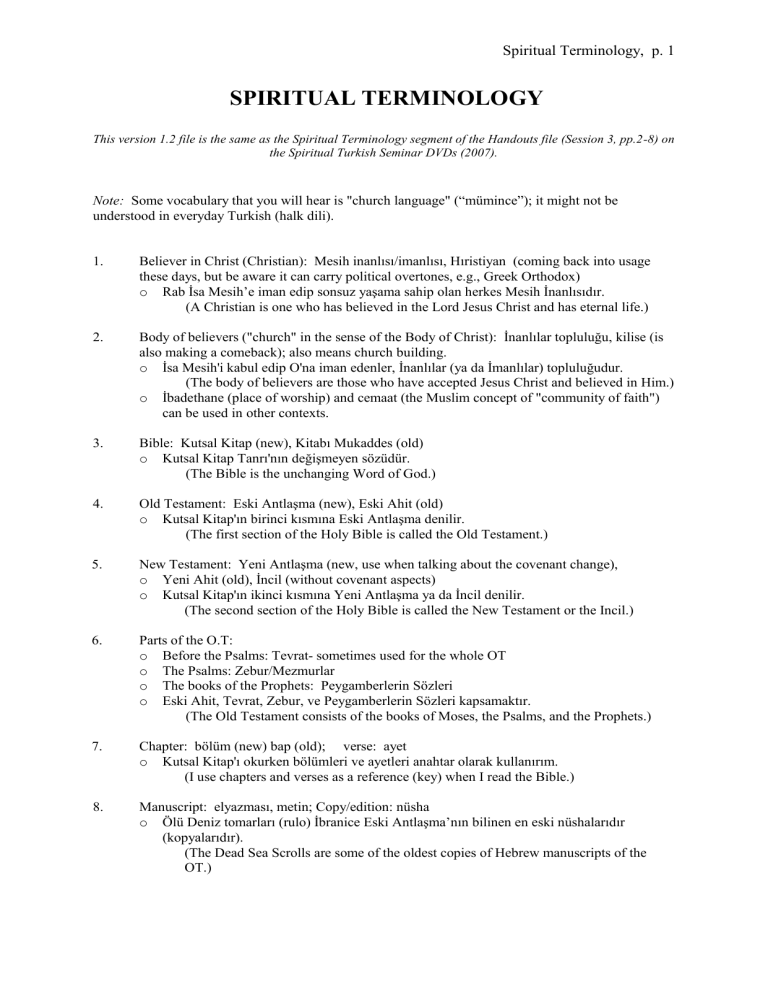
Spiritual Terminology, p. 1
SPIRITUAL TERMINOLOGY
This version 1.2 file is the same as the Spiritual Terminology segment of the Handouts file (Session 3, pp.2-8) on
the Spiritual Turkish Seminar DVDs (2007).
Note: Some vocabulary that you will hear is "church language" (“mümince”); it might not be
understood in everyday Turkish (halk dili).
1.
Believer in Christ (Christian): Mesih inanlısı/imanlısı, Hıristiyan (coming back into usage
these days, but be aware it can carry political overtones, e.g., Greek Orthodox)
o Rab İsa Mesih’e iman edip sonsuz yaşama sahip olan herkes Mesih İnanlısıdır.
(A Christian is one who has believed in the Lord Jesus Christ and has eternal life.)
2.
Body of believers ("church" in the sense of the Body of Christ): İnanlılar topluluğu, kilise (is
also making a comeback); also means church building.
o İsa Mesih'i kabul edip O'na iman edenler, İnanlılar (ya da İmanlılar) topluluğudur.
(The body of believers are those who have accepted Jesus Christ and believed in Him.)
o İbadethane (place of worship) and cemaat (the Muslim concept of "community of faith")
can be used in other contexts.
3.
Bible: Kutsal Kitap (new), Kitabı Mukaddes (old)
o Kutsal Kitap Tanrı'nın değişmeyen sözüdür.
(The Bible is the unchanging Word of God.)
4.
Old Testament: Eski Antlaşma (new), Eski Ahit (old)
o Kutsal Kitap'ın birinci kısmına Eski Antlaşma denilir.
(The first section of the Holy Bible is called the Old Testament.)
5.
New Testament: Yeni Antlaşma (new, use when talking about the covenant change),
o Yeni Ahit (old), İncil (without covenant aspects)
o Kutsal Kitap'ın ikinci kısmına Yeni Antlaşma ya da İncil denilir.
(The second section of the Holy Bible is called the New Testament or the Incil.)
6.
Parts of the O.T:
o Before the Psalms: Tevrat- sometimes used for the whole OT
o The Psalms: Zebur/Mezmurlar
o The books of the Prophets: Peygamberlerin Sözleri
o Eski Ahit, Tevrat, Zebur, ve Peygamberlerin Sözleri kapsamaktır.
(The Old Testament consists of the books of Moses, the Psalms, and the Prophets.)
7.
Chapter: bölüm (new) bap (old); verse: ayet
o Kutsal Kitap'ı okurken bölümleri ve ayetleri anahtar olarak kullanırım.
(I use chapters and verses as a reference (key) when I read the Bible.)
8.
Manuscript: elyazması, metin; Copy/edition: nüsha
o Ölü Deniz tomarları (rulo) İbranice Eski Antlaşma’nın bilinen en eski nüshalarıdır
(kopyalarıdır).
(The Dead Sea Scrolls are some of the oldest copies of Hebrew manuscripts of the
OT.)
Spiritual Terminology, p. 2
9.
God: use Tanrı; needs to be filled with Biblical meaning.
o Tanrı is used for the name Elohim in Hebrew.
o Allah is used by most Turks and by some believers. Believers who use Allah seem to use
it interchangeably with Tanrı. Some believers feel that Allah is Islamic and prefer not to
use the term.
o RAB (the word for Yahweh), Rab (the word for Adonai) is also used for Lord.
10.
God's presence: Tanrı'nın huzuru or Tanrı'nın varlığı
o The first one is ‘entering His presence’, e.g., Şimdi duayla Tanrı'nın huzuruna gelelim.
o The second one has more the idea of ‘God's presence is with us’,
e.g. Varlığım sana eşlik edecek – Ex. 33:14
11.
Justice: adalet; just, fair: adil; to judge: yargılamak; a judge: yargıç
o Tanrı adildir ve adaletini Oğlunu kurban ederek gösterdi.
(God is just and showed his justice by sacrificing his Son.)
o Dünyanın Yargıcı Kıyamet Gününde bütün insanları yargılayacaktır.
(The Judge of the world will judge all people on Judgment Day.)
12.
Holy: kutsal; righteous: doğru (new), salih (old); righteousness: doğruluk
o Pure, clean: pak ‘Mesih pak olduğu gibi’ (just as Christ is pure ) I John 3:3
o To purify: temiz/pak kılmak ‘Tanrı’nın temiz kıldıklarına sen bayağı deme’
(Do not call anything impure that God has made clean.) Acts 10:15)
o Tanrı kutsal, doğru, ve paktır. (God is holy, righteous, and pure.)
13.
Trinity: Üçlü Birlik, Üçlük (Muslim word: teslis)
o Baba, Oğul ve Kutsal Ruh Üçlü Birliktir.
(The Father, Son and Holy Spirit are the Trinity.)
14.
Holy Spirit: Kutsal Ruh
o To be filled with the Spirit: Kutsal Ruh'la dolmak/doldurulmak
o Spiritual: Ruhsal, ruhani
o Ruhsal tapınmanız budur. (This is your spiritual act of worship) Rom. 12:1
15.
Savior: Kurtarıcı; salvation: kurtuluş;
to save: kurtarmak;
o Rabbimiz İsa Mesih'ten başka Kurtarıcı yoktur.
(There is no other Savior than our Lord Jesus Christ.)
16.
To sin: günah işlemek
o Hayatımızda birçok şekilde günah işleyebiliriz.
(In our lives we can sin in many different ways.)
o To confess our sins: günahlarımızı itiraf etmek (James 5:16, I John 1:9)
17.
Sinner: günahkâr, günahlı
o Hepimiz günahkârız ve her gün Tanrı'ya karşı günah işliyoruz.
(We are all sinners and every day we sin against God.)
18.
Unclean: murdar is used in the new translation (see Isaiah 64:6) / kirli
o Murdara dokunmayın (Touch no unclean thing.) II Cor. 6:18
19.
To repent: tövbe etmek
o Tövbe edin, Müjde’ye inanın (Repent and believe the good news.) Mark 1:15
o Tövbe etmek fikirlerini ve davranışlarını değiştirmek demektir.
(To repent means to change your mind and your actions.)
to be saved: kurtulmak
Spiritual Terminology, p. 3
20.
Separation: ayrılma, ayrılık; to separate: ayırmak;
to be separated: ayrılmak or ayrı düşmek
o Günahlarımız bizi Tanrı'dan ayırdı.(Our sins have separated us from God.)
o Tanrı'dan ayrıldık or Tanrı'dan ayrı düştük. (We were separated from God.)
21.
Sevap: Their concept of ‘good works’ especially to gain God's acceptance, ‘brownie points’
o Biz sevaplarımızla (iyi işlerimizle) Tanrı tarafından kabul edilmeyiz.
(We cannot be accepted by God through our good works.)
o Kurtuluşu kazanamayız, hak edemeyiz (We cannot earn/deserve salvation.)
22.
To forgive sin: günahı bağışlamak, affetmek
o Tanrı günahlarımızı bağışladığı gibi, biz de birbirimizi bağışlamalıyız.
(Just as God forgave our sins, we should forgive each other.)
o To be forgiven: bağışlanmak, affedilmek
23.
Forgive me: helal et (An Islamic term which literally means ‘to make lawful’, to give up a
legitimate claim to another. This is said when leaving someone to make sure that forgiveness
has been granted)
o Servant's rights: kul hakkı (the Islamic belief that God will not forgive you if you are not
forgiven of your sins against another)
o (Kul) hakkımı helal et (Please forgive if I have hurt you, or taken your rights.)
24.
To cleanse (purify): arındırmak; be cleansed (purified): arınmak
o Güvenilir ve adil olan Tanrı günahlarımızı bağışlayıp bizi her kötülükten arındıracaktır.
(God who is faithful and just will forgive our sins and purify us from all unrighteousness.)
I John 1:9
25.
Justification: aklama; to justify: aklamak; to be justified: aklanmak
Emphasize the forensic aspect of this, that it means to be declared by God to be ‘100%
righteous.’ Usually it might be best to talk about being accepted....'Tanrı bizi artık kabul
etmektedir.'
o İbrahim iman sayesinde aklanmış sayıldı (Heb. 4:9)
o Kutsal Ruh İsa Mesih'in kanıyla bizi akladı
(The Holy Spirit justified us through Jesus Christ's blood.)
26.
To surrender myself: kendimi adamak/teslim etmek.
o Hayatımı yönetmesi için kendimi İsa Mesih'e teslim ettim.
(I surrendered myself to Jesus Christ and His control over my life.)
o A surrendered life: adanmış bir yaşam
27.
Belief: inanç; faith (belief): iman.
o İnancın var mı? Neye inanıyorsun?
(Do you have a belief? What do you believe in?)
28.
To believe: inanmak, iman etmek
o Güvenmek may be more personal than iman etmek. Inanmak is very weak and tends to
remain at the intellectual level only. Most people recognize that the meaning of iman
etmek is used primarily of belief in God.
o Ben İsa'ya Kurtarıcım olarak inanıyorum (güveniyorum).
(I trust or believe in Jesus as my Savior.)
o İsa'ya iman ederek/güvenerek kurtuluşu armağan olarak alıyoruz.
(We receive the gift of salvation by faith in Jesus.)
Spiritual Terminology, p. 4
29.
Cross: çarmıh
o He was nailed to a cross: çarmıha gerildi (literally ‘stretched on a’ + ‘cross’)
("haç" also means "cross" but has negative connotations from the Crusades;
“cross” in reference to a necklace is "haç".)
o İsa bizim günahlarımız için çarmıha gerildi.
(Jesus was crucified for our sins.)
30.
By his blood: kanıyla (Needs explanation, especially the instrumental use of -la)
o O’nun kanıyla kurtulduk (We were saved through His blood.)
31.
Sacrifice: kurban
o Bir kuzu gibi İsa bizim uğrumuza/için/yerimize kurban oldu.
(Jesus was sacrificed like a lamb for our sakes.)
o İsa'nın dirilişi Tanrı’nın Mesih’in çarmıhta ölümünü kurban olarak kabul ettiğini
gösteriyor.
(Jesus' resurrection shows that God accepted Christ’s sacrifice on the cross.)
32.
Bore our penalty: cezamızı çekti (took our punishment)
o To punish: cezalandırmak
o İsa bizim uğrumuza/için/yerimize cezalandırıldı (Jesus was punished for our sakes.)
33.
Ransom: fidye (like the Greek term this word is economic and speaks of the price paid to
free someone)
o Canını birçokları için fidye olarak vermeye geldi. – Matt. 20:28
(He came to give His life as a ransom for many.)
o Redemption: fidye ile kurtuluş (to be delivered with a price)
34.
Substitute, value: bedel
o İsa günahlarımızın bedeli olarak öldü (Jesus died as our substitute.)
o The best is still to say ‘İsa bizim yerimizde öldü’ (Jesus died in our place.)
35.
Atonement: No word in modern Turkish...Kefaret in old Turkish still might be okay.
o In Exodus 30:15, bağışlanma bedeli is used for atonement money.
o The Day of Atonement in Leviticus 16 and 23 is Günahların Bagışlanma Günü.
o The term in Hebrew means ‘cleansing’ so arındırma would apply.
o Atoning sacrifice - günahlarımızı bağışlatan kurban (günahlarımıza kefaret)
o Propitiation - gazabı yatıştırmak (not used in the new translation; see I John 2:2, 4:10 and
notes)
36.
Resurrection: diriliş; to be raised from the dead: ölümden dirilmek
o İsa ölümden dirildiği için imanımız boş sayılmaz.
(Because Jesus rose from the dead our faith is not in vain.)
o Tanrı İsa’yı ölümden diriltti (God raised Jesus from the dead.)
37.
Grace: lütuf; God's grace: Tanrı'nın lütfu
o Lütufla kurtuldunuz (By grace you have been saved) Eph. 2:8
38.
Mercy: merhamet
o Merhameti bol olan Tanrı (God who is rich in mercy) Eph. 2:4
39.
Love: sevgi
o Sevgi sabırlıdır (Love is patient) I Cor. 13:4
40.
Joy: sevinç;
rejoice: sevinmek
Spiritual Terminology, p. 5
o
Her durumda sevinmeyi öğreniyorum.
(I am learning to rejoice in every situation.)
41.
Peace: esenlik (within); barış (between enemies);
reconciliation: barışma
o Tanrı’yla barıştırıldığım için yüreğim esenlikle dolu.
(Because I have been reconciled with God, my heart is full of peace.)
42.
Hope: umut/ ümit
o Sonsuz yaşama sahip olma ümidim var.
(I have hope of having eternal life.)
43.
Prayer: dua; To pray: dua etmek
o Her konudaki dileklerinizi Tanrı'ya dua edip yalvararak şükranla bildirin (Phil. 4:6)
(In everything by prayer and petition with thanksgiving present your requests to God.)
44.
To witness: tanıklık etmek/vermek; testimony/witness: tanıklık
o Tanıklık etmek (just like the Greek and Hebrew words) have a ‘court’ flavor.
We should emphasize the truth of the testimony, whatever it is.
o The Good News (Gospel): Müjde; to evangelize: müjdelemek
o Uluslara tanıklık edeceksiniz (witnesses to the nations/Gentiles) Matt. 10:18
o ‘...imanını başkalarıyla paylaşmakta etkin olman için dua ediyorum.’
(I pray that you may be active in sharing your faith.) Philemon 6
o Tanıklığımı seninle paylaşmak istiyorum. (I would like to share my testimony.)
45.
Fellowship: paydaşlık, paylasma, paylaşım (We tend to use the concept “I would like to share
something with you” too much and the Turkish word paylaşmak may not carry the same
meaning). Beraberlik means ‘being together’; paydaşlık means ‘sharing in common.’
o Mesih'le paydaşlığa çağıran Tanrı (1 Cor. 1:9) God who has called you into fellowship
with Christ
o Birbirimizle paydaşlıgımız var. (We have fellowship with one another.)
o The fellowship (group of believers): topluluk, cemaat (more Islamic)
46.
Prophet: peygamber; prophecy: peygamberlik; prophesy: peygamberlik etmek
o Tanrı eski zamanlarda peygamberler aracılığıyla konuştu. (Heb. 1:1)
(In the past God spoke through the prophets.)
o Biz senin adınla peygamberlik etmedik mi? (Matt. 7:22)
(Did we not prophesy in your name?)
47.
To deny: inkâr etmek
o Petrus İsa'yı üç kez inkâr etti. (Peter denied Jesus three times.)
48.
To deceive: aldatmak (also refers to adultery); to be deceived: aldanmak
o Kimse sizi aldatmasın (Don't let anyone deceive you.) I John 3:7
49.
Baptize: vaftiz etmek
o To be baptized: vaftiz olmak/edilmek
o Ben 1975'te vaftiz oldum. Beş sene sonra kızımı vaftiz ettim.
(I was baptized in 1975. Five years later I baptized my daughter.)
Spiritual Terminology, p. 6
50.
New nature: yeni yaratık used in 2 Cor. 5:17
o Doğa, öz or tabiat is the word for nature, and it might not communicate.
o New birth: yukarıdan/gökten doğuş; yeniden doğuş used in John 3:7
o Günahlarımızdan kurtulduğumuz zaman, Kutsal Ruh'un etkisiyle yukarıdan doğmuş
oluruz.
(When we are saved from our sins, we have a new birth by the power of the Holy
Spirit.)
51.
Sinful nature: doğal benlik (Müjde); benlik (İncil) Romans 7:5
o Old self: eski yaratılış (used in Romans 6:6), nefs (halk dili)
52.
Christmas: Noel Bayramı, Doğuş Bayramı (newer, used among believers)
Easter: Diriliş Bayramı (newer, used among believers); Paskalya Bayramı (old, better not to
even introduce this term; it isn’t well understood anyway)
53.
Submission: boyun eğmek (is a strong word, but doesn't carry the voluntary aspect that the
Greek word does)
o Cinler bile bize boyun eğiyor. (Even the demons submit to us.) Luke 10:17
o The new translation uses ‘bağımlı olmak’ in Eph. 5:22 when talking of wives submitting to
husbands.
54.
Adoption: evlat edinme (Heb. 12:8)
o Tanrı bizi kendi çocukları olarak evlat edindi.
(God adopted us as His children.)
55.
Attitude (of the heart): tavır or tutum.
o Sadece davranışlarımız değil tavrımız da Tanrı için çok önemli.
(Our attitudes not just our actions are very important to God.)
56.
To defeat or overcome: yenmek
o İsa, Şeytanı ve ölümü yendi.
(Jesus defeated Satan and death.)
57.
To set free: özgür kılmak, azat etmek (old but still used)
o Biz günahlarımızdan özgür kılındık.
(We were set free from our sins.)
58.
To heal: şifa vermek, iyileştirmek (to make well)
o Rab bana şifa verdi ve beni iyileştirdi.
(The Lord gave me health and made me well.)
59.
Sermon: vaaz, konuşma
o Preacher: vaiz
o Vaizin konuşması beni bereketledi. (The preacher's sermon blessed me.)
o Vaizin konuşmasından bereketlendim. (I was blessed by the preacher's sermon.)
60.
To encourage: teşvik etmek, cesaret vermek
o To strengthen: yüreklendirmek, güçlendirmek
o To comfort: teselli etmek
“Sizi yüreklendirdik, teselli ettik...özendirdik” 1Th. 2:12
(encouraging, comforting and urging you)
Spiritual Terminology, p. 7
61.
Worship: tapmak, tapınmak, ibadet etmek (O’na tapınalım.)
o Praise: övmek, hamdetmek, (Seni övmek istiyorum.)
o Exalt, lift up: yükseltmek (Seni yükseltmek istiyoruz.)
o Glorify: yüceltmek (Hayatımızla O’nu yüceltelim.)
62.
Heaven: cennet (needs to be filled with biblical meaning)
o Hell: cehennem
o Cennete gidenler Tanrı’nın huzurunda daima kalır, ama cehenneme gidenler Tanrı’dan
ebediyen ayrı kalırlar.
(Those who go to heaven will always be in God’s presence, but those who go to hell
will forever be separated from Him.)
63.
Second coming of Christ: Mesih'in ikinci gelişi
o O’na iman edenler Mesih’in ikinci gelişini dört gözle beklerler.
(Those that believe on Him eagerly await Christ’s second coming.)

